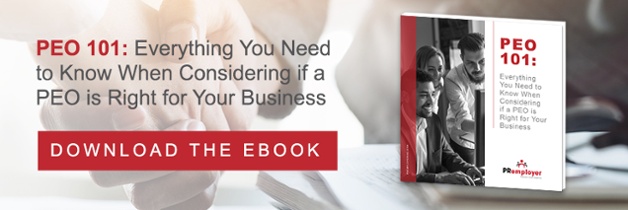As an employer, evaluating small business retirement plan options can be overwhelming. However, providing a retirement or 401(k) plan to your employees can help them save for retirement and attract and retain top talent within your organization. Despite the benefits, it’s important to understand your liability as the plan sponsor.
If you offer a 401(k) plan to your employees, you have fiduciary responsibility — and that means legal, financial, and compliance risks that could affect your business personally. Retirement plans are a valuable tool for recruitment and retention, but sponsoring a plan involves more than just administrative tasks.
Many small business owners don’t realize that by default, they’re assuming liability for plan operations, investment monitoring, and compliance. That’s why it’s important to understand the roles involved — and how partnering with a PEO can reduce your risk.
What Is a Fiduciary Under ERISA?
Under the Employee Retirement Income Security Act (ERISA), a fiduciary is defined as anyone who has discretionary authority over a retirement plan, including the management of assets and decisions regarding vendors or administration. The law sets a strict standard: fiduciaries must act solely in the best interest of plan participants. This includes employers, investment advisors, plan administrators, trustees, and even recordkeepers in certain situations.
Here’s a breakdown of the most common roles and responsibilities in a typical 401(k) structure:
Key Fiduciary Roles and Responsibilities
- ERISA Section 402(a) Named Fiduciary: Has overall control and management responsibility for the plan — often the employer or a designated administrator.
- ERISA Section 3(16) Plan Administrator: Responsible for plan operations unless delegated. Defaults to the employer if not otherwise named.
- ERISA Section 403(a) Trustee: Has exclusive authority over plan assets, unless delegated to an investment manager.
- ERISA Section 3(38) Investment Manager: A registered investment advisor (RIA), bank, or insurance company who assumes sole fiduciary liability for investment decisions.
- ERISA Section 403(a)(1) Directed Trustee: Holds plan assets and acts on the instructions of the named fiduciary but has no discretionary authority.
- Third-Party Administrator (TPA): Handles day-to-day plan compliance tasks and reporting.
- Recordkeeper: Manages participant-level data, tracks contributions, and initiates transactions.
- Financial Advisors: Provide advice, often for a fee, but may or may not be fiduciaries depending on registration and structure.
- Custodian: Holds plan assets, like a Directed Trustee, but without investment authority.
Even if you’ve hired vendors to help manage your plan, as the employer, you still bear responsibility for choosing and monitoring them. If something goes wrong — from hidden fees to a lawsuit over poor investment choices — liability could fall back on you.
Why Fiduciary Liability Matters for Small Businesses
Fiduciary missteps can lead to serious consequences: fines, lawsuits, and personal liability — even if your intentions were good. Many owners are unaware that they may be held liable for the actions of service providers they’ve hired. Key risks include:
- Improper fee structures that aren't in employees’ best interest
- Delayed contribution deposits (a common ERISA violation)
- Poor investment choices or lack of monitoring
- Inadequate bonding or audit documentation
And the Department of Labor has increased enforcement. This isn’t a space where “good enough” is safe — especially for small businesses without dedicated retirement specialists.
How a PEO Can Help Reduce Your 401(k) Liability
Partnering with a PEO helps reduce your fiduciary risk by sharing responsibility and offloading the most complex compliance burdens. As a co-sponsor of the retirement plan, your PEO helps manage regulatory requirements — and limits your exposure.
Here’s how PRemployer supports clients in this space:
- Shares plan sponsor responsibilities under a co-employment structure
- Reduces administrative burden by handling reporting, deposits, and plan documents
- Provides access to pre-vetted, high-quality investment plans
- Helps ensure compliance with fiduciary bonding, ERISA standards, and timely filing
- Supports your team in educating employees and managing communications
The result? You stay compliant, employees get a better retirement benefit, and your HR team has more time to focus on people — not paperwork.
Choosing the Right Retirement Plan Structure
Not all 401(k) providers or co-sponsor models are created equal — so it’s important to understand how much fiduciary risk each solution actually removes. Ask potential partners:
- Who is the Named Fiduciary under ERISA?
- Who assumes 3(16) Plan Administrator and 3(38) Investment Manager duties?
- Who manages participant communication and recordkeeping?
- What level of transparency do we have around fees?
If the answer is “you do,” you’re not offloading risk — you’re hiring support. That’s not the same thing.
The Bottom Line: Protect Your Business and Your People
Offering a 401(k) shows your employees you’re invested in their future — but it shouldn’t put your own business at risk. As a small business owner, you’ve got enough on your plate. Managing legal exposure tied to retirement plans shouldn’t be one of them.
PRemployer helps you provide competitive retirement benefits while minimizing liability, improving plan oversight, and keeping compliance in check.
Ready to simplify retirement plan management and reduce fiduciary risk? Let’s talk about how PRemployer can support your plan — and protect your business.

%20Plan%20What%20is%20Your%20Liability%3F.jpg)